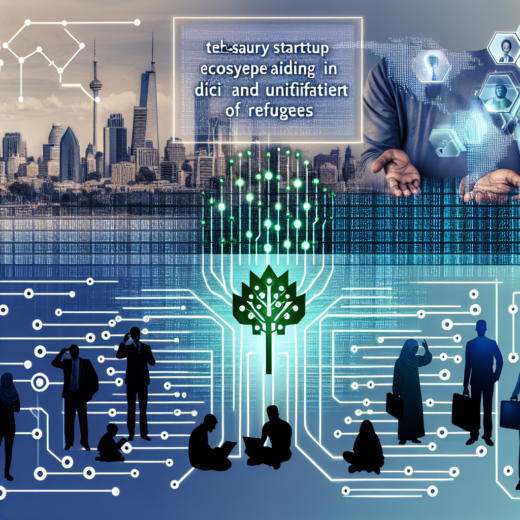Introduction
In an ever-evolving digital landscape, the plight and potential of refugees seeking to rebuild their lives through employment and entrepreneurship cannot be understated. The intersection of digital literacy and refugee resettlement presents an unparalleled opportunity for startup innovators to create meaningful solutions. This exploration delves into the potential of startups to drive market disruption through teaching essential digital skills to refugees, ultimately enhancing their employability and fostering economic integration.
Innovation Potential and Market Disruption
Digital literacy serves as a powerful tool in bridging the gap between refugees and meaningful employment opportunities. Innovators see great potential in addressing this need, crafting programs and technologies that empower refugees to navigate the digital world confidently. By equipping refugees with the right skills, startups can drive significant market disruption. They facilitate their entry into the modern workforce, thus addressing a critical humanitarian need while tapping into a vast, underserviced market segment.
The global refugee crisis has led to unprecedented migration flows, meaning there are substantial numbers of economically active individuals whose skills are currently underutilized. For tech-savvy entrepreneurs, this represents a unique opportunity to create a positive impact. Tech startups like Re:Coded have pioneered in providing coding bootcamps for refugees, offering courses in web development, digital marketing, and design. Such initiatives exemplify how startups can leverage technology to unlock the latent potential of refugee populations.
Key Challenges
Critical challenges persist when addressing digital literacy for refugees. The main obstacles include linguistic barriers, limited access to technology, and cultural adaptation. The service provisions must also account for varying educational backgrounds. Bridging these gaps involves creating curriculum materials in multiple languages and designing user-friendly interfaces that require minimal prior digital knowledge. For instance, the Finn Church Aid in Uganda has implemented educational programs adaptable to the refugees’ prior education levels, thus ensuring inclusivity and effectiveness.
Moreover, the transient nature of refugee communities can further complicate startup endeavors, as developing a stable customer base is inherently challenging. Continuous political and social volatility often leads to resource reallocation, making it difficult for startups to maintain operational stability. These challenges necessitate innovative solutions and flexible business models capable of adapting to unpredictable circumstances.
Unique Opportunities in the Startup Space
Despite the challenges, significant opportunities await in the digital literacy space for refugees. Innovators can develop scalable solutions that transcend geographic and societal borders. By implementing tech-driven models, startups can reach larger audiences at lower costs. Programs such as Refugee Talent, which connects refugees with potential employers online, highlight the potential for matchmaking platforms to facilitate employment opportunities.
Moreover, collaboration with NGOs and international bodies can bolster credibility, enhance resource availability, and ensure alignment with existing humanitarian efforts. Such partnerships can also ease entry into refugee communities, allowing startups to access essential insights and data. The exponential growth of mobile technology offers a further avenue for startups to capitalize on, as mobile-based platforms can reach remote areas, circumventing the need for conventional infrastructure.
Strategies for Success
To achieve success in this evolving arena, startups must adopt specific strategies. Raising funds from impact-oriented investors who prioritize social good alongside financial returns is crucial. Crowdfunding platforms such as Kickstarter and Indiegogo have been instrumental for many startups that target social challenges. Specialty investment funds focusing on social entrepreneurship, like Acumen Fund, also provide valuable financial support.
Scaling operations requires entrepreneurs to establish strong networks within the refugee ecosystem, including collaborations with local governments, NGOs, and multinational corporations. These alliances ensure access to vital resources and can facilitate legal and logistical processes for implementing solutions. Startups should also prioritize agile development models, allowing them to iterate rapidly in response to a constantly changing environment.
Achieving product-market fit entails designing solutions that are both affordable and accessible. In the startup ecosystem, obtaining feedback directly from end-users—refugees—ensures alignment between product offerings and user needs. Customer acquisition can be enhanced through targeted communication strategies, employing digital marketing efforts that resonate with the ethos of refugee populations.
Case Studies of Successful Startups
The examination of successful startups such as RefuAid and Innovate Ventures provides valuable insights. RefuAid offers language and vocational training paired with microfinance, enabling refugees to ease into their new environments efficiently. Their model highlights the importance of combining education with financial services to facilitate holistic integration.
Innovate Ventures exemplifies how start-ups can effectively address regional needs; based in Somalia, it focuses on training youth and refugees in entrepreneurship and technology. By tailoring their programs to the local context, they not only promote digital literacy but stimulate innovation within refugee communities themselves.
Academic Research and Industry Reports
Academic research underscores the importance of digital literacy in bridging socio-economic divides. Studies by the UNHCR reveal that access to education, including digital literacy, plays a critical role in the socio-economic integration of refugees. Similarly, industry reports like those from the World Economic Forum advocate for increased investment in technology, emphasizing that such investments can significantly enhance refugees’ employment outcomes.
Conclusion
Addressing digital literacy for refugees stands as a beacon of opportunity amidst the fog of global displacement challenges. For entrepreneurs and startups, this burgeoning field offers a dual potential: the chance to drive societal impact while leveraging untapped market opportunities. Through innovative solutions, strategic partnerships, and community-centric frameworks, startups can transform the landscape of refugee employment and foster a more inclusive digital economy. The journey toward digital empowerment for refugees is not without challenges, but the potential rewards—in both human and economic terms—are profound and worthy of pursuit.

